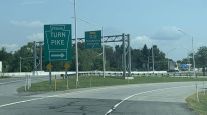Staff Reporter
Experts: As a Funding Tool, Tolling May Benefit From an Image Shift

[Stay on top of transportation news: Get TTNews in your inbox.]
WASHINGTON — Transportation experts said recasting tolling’s image from an unpopular fundraising mechanism may increase its attractiveness to the public.
Robert Poole, director of transportation policy for Reason Foundation, urged transportation leaders to shift their focus away from the revenue generated from tolls. Instead, he said they should focus on benefits such as smoother payments and reduced congestion.
Poole spoke at the Transportation Investment Advocacy Center’s Workshop for State and Local Transportation Advocates here on July 17.
“Too much of the focus is on revenue. That makes motorists suspicious. They see this as a money grab,” Poole said. “I see this as a strategy that throws pain in people’s faces, and that’s not a way to win.”

Aument
Jennifer Aument, president of the toll operating company Transurban’s business in North America, said tolls should be assessed in terms of their ability to improve busy lives, such as saving 80 minutes on a road trip.
Poole listed several counterproductive techniques that legislators sometimes use to present toll benefits, including heavier charges for out-of-state travelers (which violate the Commerce Clause) and trucks-only tolls.
Rhode Island’s trucks-only tolling program, which has been in effect since 2018, has resulted in a legal battle between the state department of transportation and the trucking industry.
Tolling systems have been points of contention for transportation projects across the country. Tolls were considered as a funding mechanism to make improvements to Interstate 81 in Virginia, which runs for 325 miles and facilitates 42% of the state’s interstate truck vehicle miles traveled.

Austin
Virginia Rep. Terry Austin supported tolls on the route, but the proposal was met with harsh criticism from the trucking industry and stalled during deliberations in Richmond. Instead, lawmakers agreed on a plan that included an increase in truck registration fees, a hike to the road and diesel tax rates and a regional fuel tax as means of generating funds for Virginia’s interstates, including $150 million for I-81.
“It’s not a fix, by any means, but it is a start,” Austin said.
In Alabama, tolling has been floated as a fundraising mechanism for a $2 billion project to build a bridge over the Mobile River to alleviate I-10 traffic in the Mobile Bay area. Alabama Sen. Chris Elliott said his confidence in the entire project has been shaken because of the public’s opposition.
“Tolling is a bad word right now where I come from,” Elliott said.




